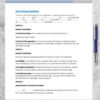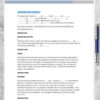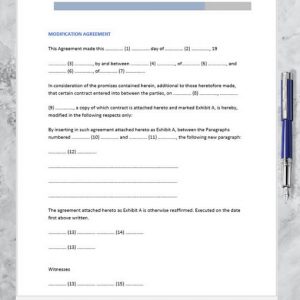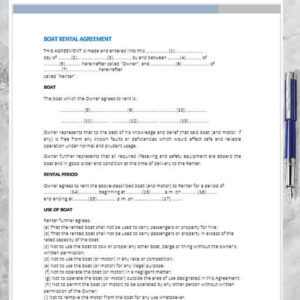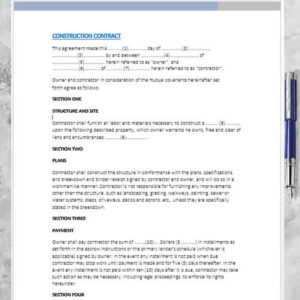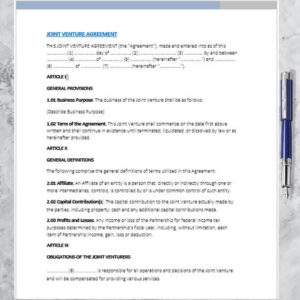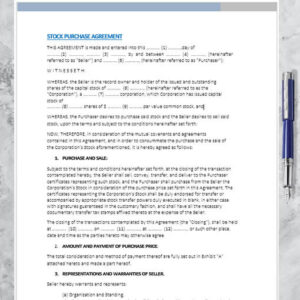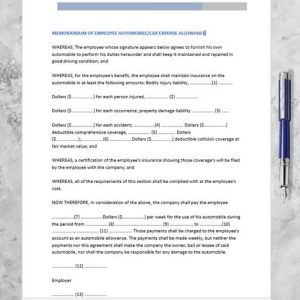Employment Agreement
$20.00 Original price was: $20.00.$10.00Current price is: $10.00.
Microsoft office employment contract template for hiring new employees. Ideal for recruiters & small businesses. Download, edit & print in minutes.
Included:
- 4-pages Employment Agreement template file
- Two formats – Microsoft Word Doc file (editable) & PDF file
Employment contracts are agreements between an employer and their employee stating the rights, duties and responsibilities of both parties. It sets out the terms of the legal relationship between employee and employer.
Employment contracts provide vital assistance in setting the tone of your business and set out clear terms for employers and employees to follow. This contract is a straightforward and efficient means of laying out any expectations for both parties and lays the foundation for their mutually beneficial relationship. These can be used for either permanent employees, temporary employees, or fixed-term employees.
Model employee contracts should cover areas regarding: start date, probation periods, job title, main place of work, pay, working hours, pension, employee benefits, sickness/injury, holidays, , notice period, confidentiality, employer’s property, lay-off termination and restrictive covenants.
When to use employment contracts
You should use employment contracts when:
- You wish to employ a new individual, sign an updated employment contract with an existing employee or an existing employee has a new job role within your business;
- You wish to present the written employment information as required by law;
- You wish to use the employee contract to clarify the terms of employment;
- You are an employee or employer situated in England, Wales or Scotland; and
- You wish to create a fixed-term, temporary or permanent contract.
The employment contract covers
- Employment start date;
- Job title
- Agreed-upon working hours and days;
- Probation period
- Terms regarding holidays;
- Terms regarding potential sickness or injury of employees;
- What the job entails/duties of the job;
- Confidentiality;
- Employer’s property;
- Pay rates and additional benefits (for both full-time and part-time);
- Place of work/;location;
- Standard disciplinary and grievance actions/procedures;
- Arrangements for terminating employment, i.e. notice period(including for temporary jobs);
- Information regarding trade unions and pensions as required by law;
What is an employment contract?
Employment contracts are written agreements between the employer and employee stating the rights, duties and responsibilities of employer and said employee.
Can the employee’s place of work be relocated?
As an employer, if you intend to move locations or expand into multiple locations in the future, this has to be specified in the employment contract to ensure that you have the right to move the employee to a new place of work potentially.
If one does not have this right, the employee is able to refuse to move if they desire, which can cause future legal and practical problems for the business.
In order to make the right to move employees more flexible and accepting, one usually puts a geographical limit on the distance within which the place of work may be relocated.
The employment contract allows the employer to specify within which areas employees might be expected to work.
Any amendments to the terms of employment should be set out in writing to the employee as soon as possible and within one month of the change.
Is the offer letter more important than the employment contract?
When the employer gives both an offer letter and an employment contract, it is crucial to state which document is of more importance (assuming there is a difference).
In most employment contracts it states that they are usually are prioritized over the offer letter.
Is it necessary to have a separate job description?
Having a separate job description is necessary when you want to give a more detailed description of what the job entails; it can help bring clarity, especially for mid-level to senior employees.
However, it is only necessary to refer to a separate job description if it is genuinely going to be used in practice. If not, the employment contract should contain a brief explanation of the job.
Employment contracts allow employers to either reference a separate job description if necessary or describe the duties in the contract itself.

